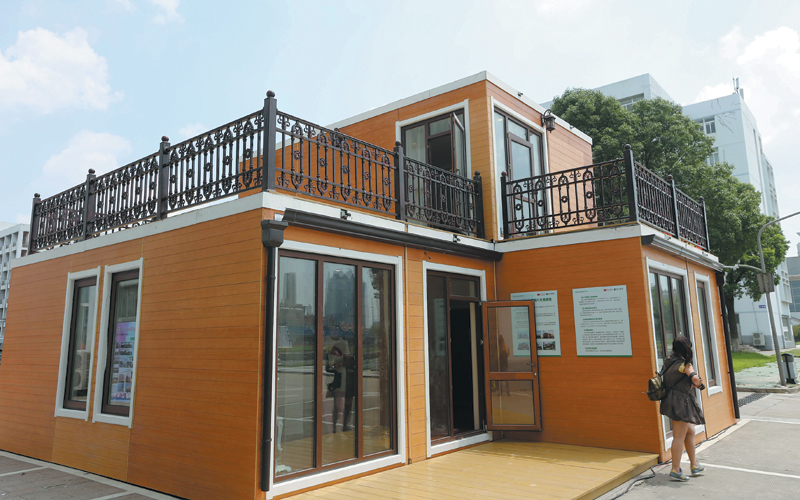Various kinds of structures are increasingly being pieced together using factory-assembled sections, Li Fusheng and Zhu Beining report.
The city of Nantong in Jiangsu province is blazing a new trail in the construction sector.
Instead of constructing buildings brick by brick, several companies in the city are manufacturing them in pieces on production lines.
At Zhuoda New Material, building components such as walls, staircases, kitchens and bathrooms are mass-produced.
By putting them together like gigantic building blocks, construction workers can finish a small building within several hours, such as a two-story building on the campus of Nantong Vocational University.
Prefabricated items are not something experimental in Nantong, where Longxin Group produces preshaped steel bars of different shapes and sizes that quickly form the structure of floor plates. The company produces 100,000 square meters of prefabricated floors each year.
In addition, products from local companies such as Longxin boast world-class quality. Longxin’s prefabricated girders meet the strict standards of such countries as Japan and Singapore.

The Zhongnan Group’s products are gaining popularity in Shanghai and other parts of the Yangtze River Delta. Statistics show that more than 90 percent of parts in some of Zhongnan’s construction projects are prefabricated on production lines.
Local authorities in Nantong are also helping fuel the industry’s progress.
From the beginning of 2015, the city government has released a series of policies including Opinions on Promoting the Construction Industry’s Transformation and Upgrading, which outlines the steps needed and a timeline for industrial transformation.
According to the document, prefabricated buildings will account for 10 percent of new freestanding buildings by 2017, industrialized construction will account for 30 percent of all new construction projects by 2020 and prefabricated buildings will account for 50 percent of all new buildings in the city by 2023.
In addition, systems of sound technical standards, evaluations and administrative supervision should be put in place and Nantong should have built up a reserve of professionals by 2023, according to the government.
In order to realize these goals, the government demands that affordable housing and public construction projects be built using prefabricated components.
It also stipulates that land for construction earmarked for prefabrication projects will grow by 4 to 5 percent each year and offers a subsidy of 50 yuan ($7.80) per square meter for such projects.
According to the government, prefabricated buildings will total 250,000 square meters in 2015, a 66.7 percent surge from the previous year.
“Generally speaking, the construction sector is a labor-intensive industry. It also takes time, consumes many resources and has a relatively large impact on the environment,” said Nantong’s Deputy-Mayor Shen Lei.
“So we must promote its modernization and drive its development with innovation to reinvigorate the industry and thus consolidate Nantong’s advantage in construction.”
As the sector starts its transformation, companies specializing in the production of prefabricated items are also gaining popularity in Nantong.
The Huaxin Group will establish an industrial base in Haian county by the end of the year and Zhongnan and Longxin will both expand their capacity in the city of Haimen, which is under Nantong’s jurisdiction.
The Zhongnan Group, Longxin Group and Jiangsu Tongchuang also have research institutes in the sector in Nantong.
“We actively encourage companies at different stages of the industrial chain to work together so they can develop into an industrial alliance capable of design, production and project implementation,” said Ma Jianming, director of Nantong’s construction bureau.
Contact the writers through lifusheng@chinadaily.com.cn
